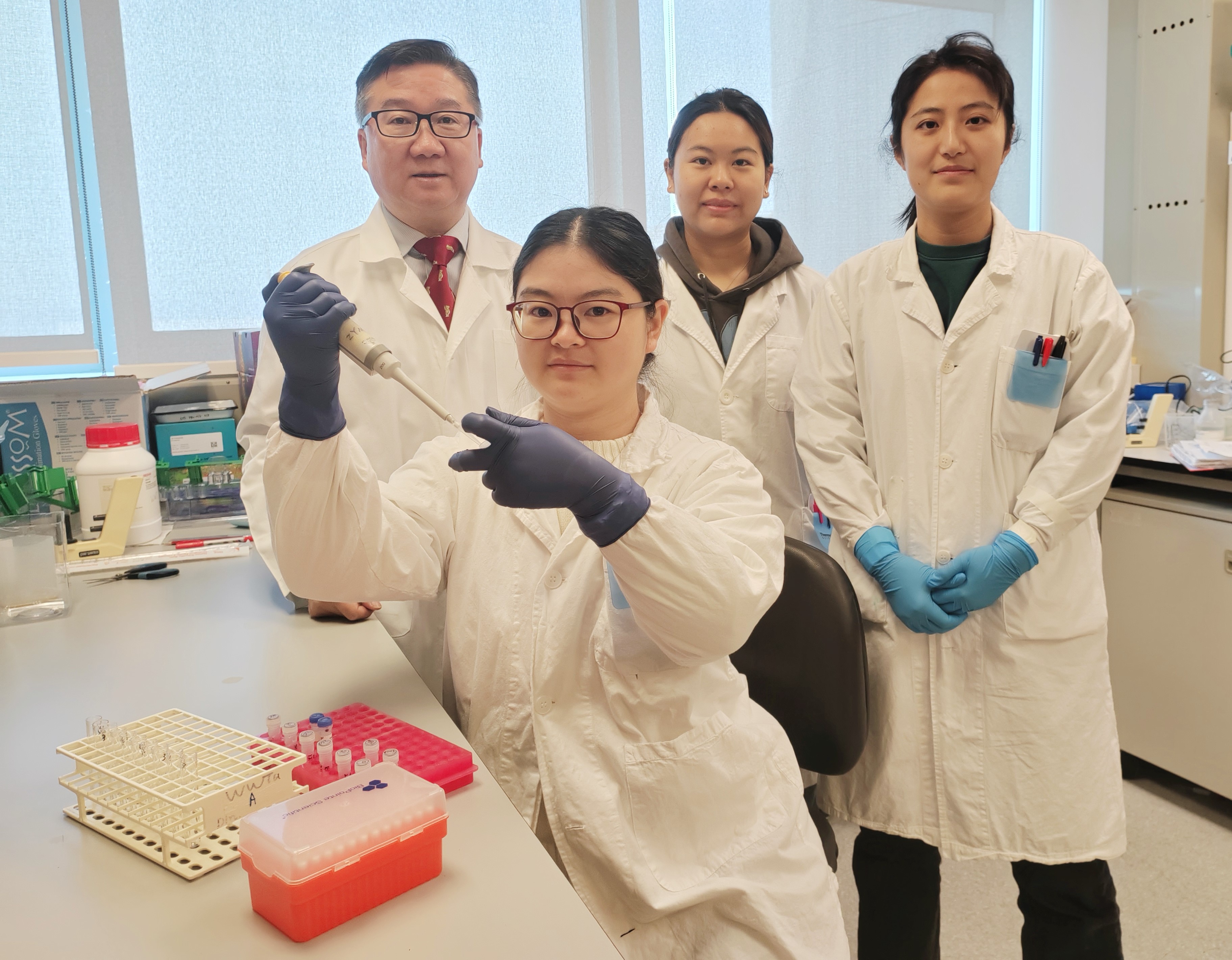13 March 2024
A research team at the LKS Faculty of Medicine, the University of Hong Kong (HKUMed), has discovered that exosomes derived from γδ-T cells not only have direct anti-tumour effects but also, when developed into a tumour vaccine, can effectively induce a tumour-specific immune response. The findings, which provide a new approach to cancer treatment, were published in the prestigious scientific journal Journal of Extracellular Vesicles [link to the publication].
Background
Exosomes are nanoscale particles secreted by cells, carrying various substances, such as lipids, proteins and nucleic acids, that play a crucial role in intercellular communication. Exosomes have been explored for developing tumour vaccines, as they can protect vaccine components from degradation, improve stability, extend the biological half-life, and enhance antigen uptake by antigen-presenting cells (APCs). Previous studies focused on exosomes derived from tumour cells (TExos) and dendritic cells (DC-Exos) but found limitations in terms of safety and clinical efficacy.
In this study, the research team focused on exosomes derived from human γδ-T cells, a rare subset of T cells known for their direct anti-tumour activity and ability to enhance T-cell responses.
Research findings
The research team discovered that γδ-T cell-derived exosomes (γδ-T-Exos) exhibited dual anti-tumour activities by carrying cytotoxic and immunostimulatory molecules that can directly kill tumour cells and stimulate the immune system. They found that γδ-T-Exos has adjuvant effects, enhancing the expression of antigen-presenting and releasing molecules that promote inflammation, which improves the ability of the immune system to recognise and attack tumour cells. Developing tumour vaccines by loading γδ-T-Exos with tumour-associated antigens proved more effective in promoting tumour-specific T-cell responses than using γδ-T-Exos alone. The vaccine strategy also retained direct anti-tumour effects and induced tumour cell death.
Intriguingly, the research showed that vaccines based on allogeneic γδ-T-Exos (derived from different individuals) exhibited similar preventive and therapeutic effects as vaccines based on autologous γδ-T-Exos (derived from the same individual) in mouse models. This suggests that this approach is suitable for centralised and standardised production. The vaccines have dual anti-tumour capabilities in effectively killing tumour cells and indirectly inducing a T-cell-mediated anti-tumour immune response, leading to better tumour control than existing vaccine strategies.
Professor Tu Wenwei, from the Department of Paediatrics and Adolescent Medicine, School of Clinical Medicine at HKUMed, who led the research, stated, ‘Our study revealed for the first time the adjuvant effects of γδ-T-Exos and its ability to effectively induce tumour-specific T-cell responses when used in tumour vaccines. In multiple mouse models, γδ-T-Exos-based vaccines effectively controlled tumour development and progression. More importantly, allogeneic γδ-T-Exos-based vaccines had similar anti-tumour effects as autologous γδ-T-Exos-based vaccines. Therefore, γδ-T-Exos derived from healthy donors can be used to treat allogeneic tumour patients, which greatly facilitates the clinical promotion and application of this new therapy.’
Significance of the study
The findings of the study have significant implications for cancer immunotherapy. The adjuvant effects observed in γδ-T-Exos highlight their potential for cancer vaccines, as they can effectively deliver tumour antigens. They have dual anti-tumour effects, surpassing the efficacy of DC-Exos-based vaccines.
Additionally, allogeneic γδ-T-Exos-based vaccines show promise for clinical practice, as they simplify the personalised preparation process and allow standardised production. These findings have the potential to improve cancer treatment outcomes by offering a more streamlined and accessible approach.
About the research team
The study was led by Professor Tu Wenwei, Department of Paediatrics and Adolescent Medicine, School of Clinical Medicine, HKUMed. The first author was Dr Wang Xiwei, post-doctoral fellow on Professor Tu's team. Other researchers from HKUMed include PhD students Zhang Yanmei, Chung Yuet, Zhang Wenyue and Wang Manni; post-doctoral fellow Mu Xiaofeng; Professor Godfrey Chan Chi-fung, Tsao Yen-Chow Professor in Paediatrics and Adolescent Medicine; Professor Leung Wing-hang, Jiaohua Su Professor in Paediatric Oncology and Transplant; Professor Lau Yu-lung, Doris Zimmern Professor in Community Child Health and Chair Professor of Paediatrics; Research Officer Dr Liu Yin-ping; and Chloe Tu Ran, Dana-Farber Cancer Institute, Harvard University, USA.
Acknowledgements
This research was supported by grants from the Research Grants Council, and the Health and Medical Research Fund of the Food and Health Bureau of the HKSAR Government; the Seed Funding for Strategic Interdisciplinary Research Scheme of the University of Hong Kong; and The Science and Technology Project of the Shenzhen Institute of Synthetic Biology in China.
Media enquiries
Please contact LKS Faculty of Medicine of The University of Hong Kong by email (medmedia@hku.hk).


Follow HKUMed